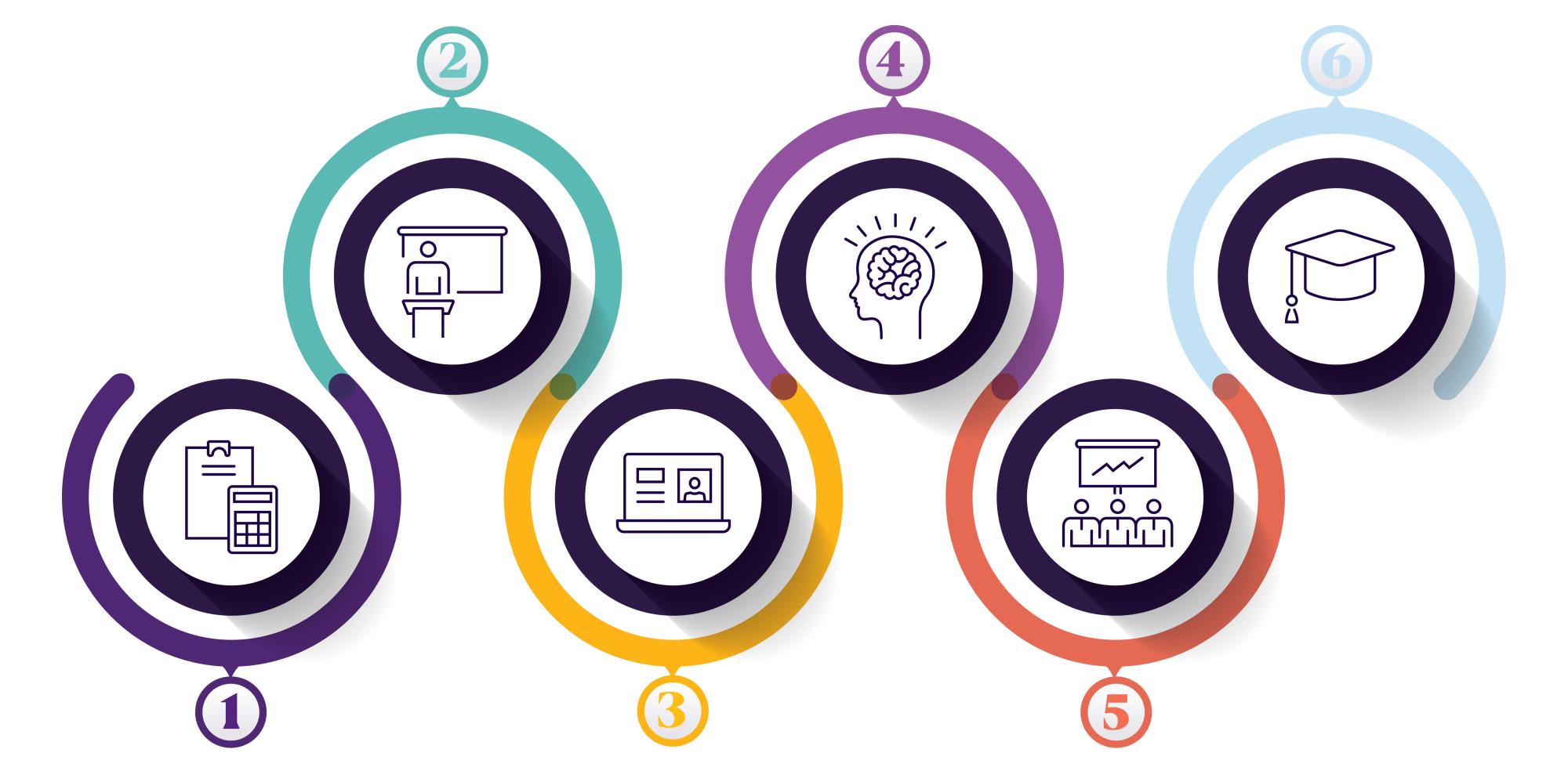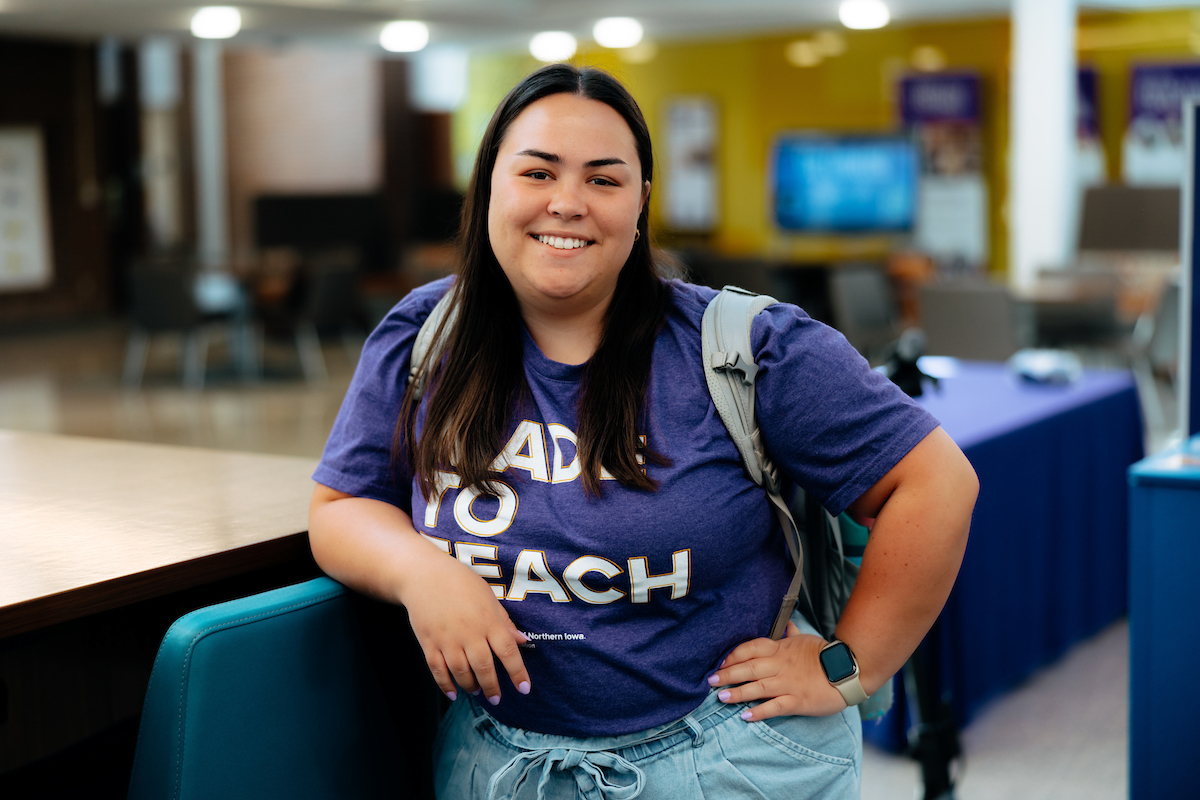Getting Started
Becoming a teacher means you’re earning a professional degree that will prepare you to seek a teaching license. Getting started involves:
- Initial admission and enrollment at University of Northern Iowa
- Formal admission and orientation to UNI Teacher Education
Whatever your background – high school student, adult learner, transfer student, professional seeking to make a career change – your first step is to apply and enroll. You’ll attend the orientation that fits for you, connect with advisors, get registered, and soon find yourselves in class!
What happens next – and when – will depend on your individual situation. However, most students should be in position to formally apply to teacher education during their first year on campus.
Path to Teaching

1. Begin your coursework.
Start building your foundation in your chosen area of teaching.
2. Get at least 10 hours of pre-program experience in the field.
Work with PreK-12 students to get a closer look at teaching as a career. Experience prior to enrollment often fulfills this requirement.
3. Apply to teacher education.
Maintaining above a 2.5 GPA? Apply to the UNI Teacher Education Program -- and celebrate at the Teacher Education Convocation & Celebration!
4. More courses! More field experience!
Teach your first lessons during 35 hours or more in local schools for Internship 1. Next up? Internship 2, another 35 hours or more of immersion in classrooms.
5. Student teach.
It all comes together in your final semester of 16 weeks of student teaching in Iowa, nationally or even internationally!
6. Graduate, get your license to teach.
Get your diploma and then time for licensure! We’ll assist you through the process with the Iowa Board of Educational Examiners.
How might your path vary?
Your individual circumstances may vary. For example:
- Planning to teach a high school subject? You’ll likely start on subject coursework your first year before moving into your first internship and methods course.
- Adding a minor like special education? In some disciplines you’ll have additional time working with students in the field–all built in as part of your coursework.

Formal admission to UNI Teacher Education happens on a continuous basis. Once at UNI and taking classes, you'll soon be ready to apply for admission. You must meet these criteria:
- Earn GPA of 2.5 (cumulative)
- Complete 10 hours of observation in a PreK-12 classroom (can be recorded prior to enrollment or via TEACHING 2020 taken at UNI).
Next: Submit your application (and document your pre-admission experience) through Qualtrics. Allow 1-3 business days for processing. Upon admission, you will receive a certificate that you can upload to your new account in Anthology account, the data management system for UNI Teacher Education.
To celebrate your commitment to teaching and your admission, you and your family will be invited to join us at the UNI Teacher Education Convocation and Celebration held during Family Weekend each fall.
Transfer students
If you are transferring from a community college or another four-year college or university:
- Consider connecting with a UNI admission representative. (Optional, but encouraged.)
- Access your degree audit through MyUNIverse which shows how your courses fulfill UNI’s UNIFI (general education) and major requirements.
- Attend a transfer orientation session, where you'll be assisted in completing the Declaration of Curriculum form and registering for classes.
- Ensure final transcript is on file at the UNI Admissions Office one week prior to the spring or summer semester.
Post-baccalaureate students
If you are a post-baccalaureate student seeking teacher licensure or additional areas of endorsement, enroll either as a graduate student or an undergraduate post-baccalaureate student. This applies to undergraduate post-BA students who have never attended UNI or are former students wanting to enroll as a post-baccalaureate student. In addition:
- Request a record analyst in the Office of the Registrar complete a transcript evaluation to determine a licensure program that will lead to recommendation for the license and/or endorsement desired.
Transfer AND post-baccalaureate students:
If you are a transfer student OR a post-baccalaureate student ready to apply for admission to teacher education:
- If your cumulative GPA at graduation was below 2.50, you must earn a 2.50 cumulative GPA in at least eight semester hours of coursework at UNI before you can enter the program and enroll in Level II courses.
- Courses which satisfy the major/minor and the professional education sequence taken at other institutions are used to compute eligibility for admission to the program and for student teaching.
MA students seeking teaching license
If you are seeking a teaching license while completing a master of arts (MA), contact the department that offers the major that normally leads to licensure in the areas selected. You can direct any questions on starting this process to teachereducation@uni.edu.

Educator Essentials
All UNI Teacher Education students complete Educator Essentials, a set of course options for all teaching majors that gives you the theory and foundational knowledge you need to teach.
Effective fall 2025, you benefit from a broader array of course options in six categories that give you plenty of choice and the ability to adapt – all part of keeping you on track to graduate! Added to your major and minor coursework, methods courses and experience in classrooms, you'll have the rounded education you need for becoming a professional educator.
